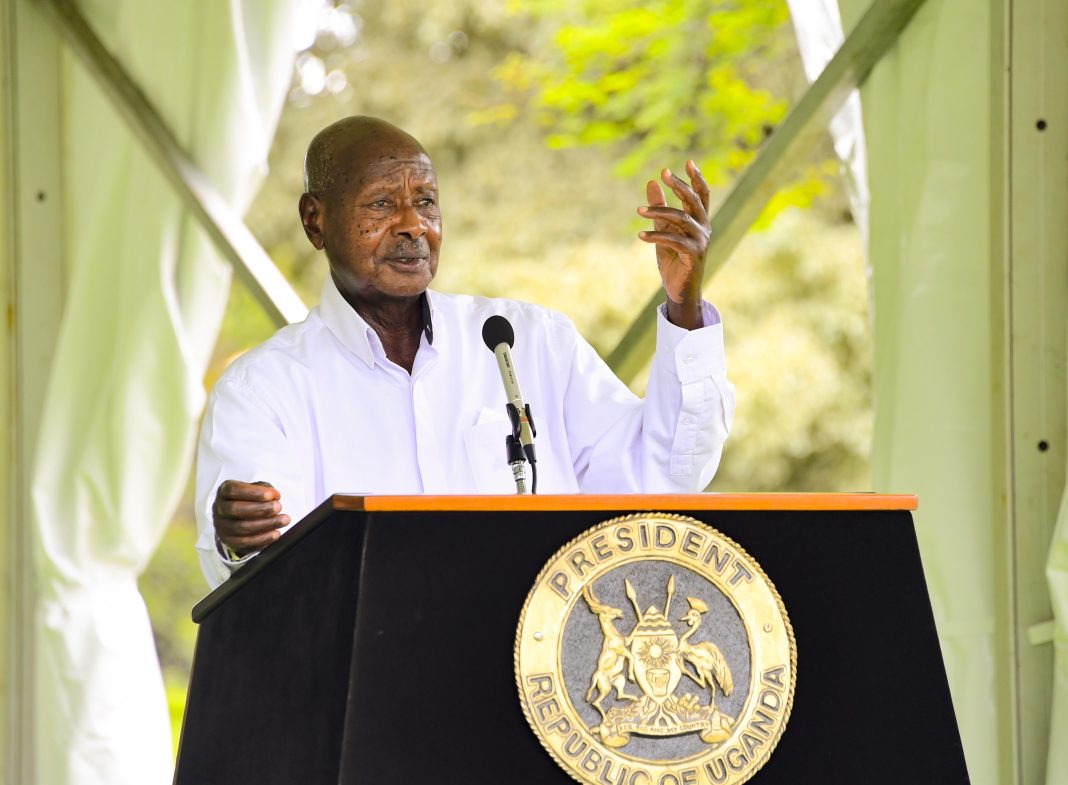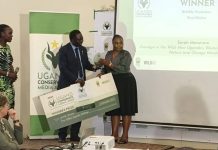President Yoweri Kaguta Museveni has called on leaders to address persistent bottlenecks undermining government service delivery and social transformation.
These bottlenecks according to him include; sabotage of free education and healthcare system, corruption and land grabbing.
The President made the remarks yesterday while meeting about 200 Chief Administrative Officers (CAOs), Town Clerks and Under Secretaries at State House, Entebbe.
The government administrators recently completed a training course at the National Leadership Institute (NALI) in Kyankwanzi.
The training, held under the theme: “Transformative Public Service: A Path to Development, Improved Service Delivery and Wealth Creation”, was aimed at equipping civil servants with ideological clarity and practical tools for national transformation.
During his address, the President identified a number of ‘irritants’ he said were eroding public trust in government.
Among these was the illegal practice of charging learners in government-aided schools, which he described as a betrayal of the Universal Primary and Secondary Education (UPE and USE) policy.
“Why has the political class failed to see the importance of Boona Basome (Education for All)?” the President asked.
“We have seen numbers dropping from primary seven to Secondary. The head teachers are sabotaging our free education program by imposing illegal charges on parents.”
President Museveni also urged CAOs and town clerks to enforce the no-fees policy in public schools and cautioned against the expansion of boarding schools under the guise of public education.
“We don’t need boarding schools in order to provide free education. Let the children sleep at home. These added costs are suffocating poor families,” he noted.
Turning to healthcare, President Museveni decried the persistent theft of drugs in government health centres, even as immunization efforts continue to succeed in eliminating diseases like measles and polio.
“The stealing of drugs is a big irritant. We must stop it. Immunization is working and we have proof some diseases have disappeared. But corruption in our health facilities continues to cause suffering,” he noted.
The President also spoke out strongly against land grabbing, particularly when facilitated by rogue elements within the security forces. He pledged to issue an Executive Order banning soldiers from involving themselves in land disputes.
“The army’s duty is to protect Uganda’s borders, not to patrol land boundaries,” he said.
He emphasized that eliminating these service delivery irritants would restore public confidence in government and accelerate national development.
On the subject of wealth creation, the President revisited the NRM’s 1996 Four-Acre Model strategy, which advocates for intensive agriculture on small landholdings.
He described the model developed after a careful study of local and international market demands as the medicine for families with fragmented land holdings.
“In our strategy, one acre should be for clonal coffee, one for fruits like mangoes or oranges, one for pasture for zero-grazing dairy cows, and one for food crops like bananas and cassava,” he said.
“In the backyard, families should rear poultry, pigs, and even engage in fish farming near wetlands. These seven activities can transform the livelihoods of smallholder farmers.”
President Museveni also contrasted this with extensive agriculture, such as tea, cotton, tobacco, and sugarcane farming, which he said only generates significant income if done on a large scale.
The President concluded by urging public servants to serve with integrity and commitment to the broader vision of socio-economic transformation.
“If you work only for the stomach and forget the pocket, you’ll remain poor. But if we combine free education, health, and wealth creation, Uganda will rise,” he said.
On his part, the Minister of Local Government, Hon. Raphael Magyezi applauded the recent two-week training programme for local government officers, describing it as timely and impactful.
Speaking on behalf of the local government fraternity, Hon. Magyezi thanked the organizers and stakeholders for facilitating the training, which he said has rejuvenated and empowered the officers to serve their communities better.
“These officers are energetic, committed, and now better equipped to deliver. I want to sincerely thank you for allowing this important training to happen,” he said.
Speaking on behalf of the officers, Mr. Gabriel Atama, the Chief Administrative Officer of Tororo District commended the President’s visionary leadership which, he said, has enabled the officers to achieve significant milestones in their respective districts.
“We are particularly grateful to Your Excellency for the opportunity to serve our country under your stewardship,” Mr. Atama said.
“With your guidance and support, we have strengthened the implementation, coordination, and supervision of government programs in line with the NRM manifesto contributing to transformative achievements across sectors,” he said.
Mr. Atama also recognized the First Lady and Minister of Education and Sports, Maama Janet Kataaha Museveni for her continued parental guidance and support to the officers and local governments.
Highlighting some of the key achievements, Mr. Atama cited the successful implementation of the Parish Development Model (PDM), noting that 10,585 SACCOs have been registered, with over Shs 2.6 trillion disbursed to benefit more than 2.6 million Ugandans.
“This directly fulfills the NRM manifesto’s promise of empowering citizens at the grassroots and enhancing household incomes,” he emphasized.
In the education sector, he reported the supervision and completion of 259 hybrid seed secondary schools, which led to a 47% increase in enrollment in 2023 and a further 18% in 2024. Girl-child enrollment now stands at nearly 50%, a demonstration of the government’s strong commitment to gender equality,” he added.
On health, Mr. Atama said that 321 new health units have been constructed, representing 84% of the term target.
“This progress has significantly improved maternal and child health indicators across several districts,” he noted.
He further pointed to progress in road construction, empowering special interest groups such as the youth, women, the elderly, and persons with disabilities (PWDs), and the strengthening of good governance through the fight against corruption.
However, Mr. Atama highlighted key challenges affecting the officers’ effectiveness.
“Many of us serve in districts far from our homes, incurring high personal costs on transport. Coupled with not enough pay and the rising cost of living. These challenges place a burden on our ability to serve optimally,” he said.
He reiterated that CAOs play a critical role in mobilizing communities, supervising government projects and ensuring accountability in sectors such as health, education, and agriculture.
“As officers committed to national development, we stand ready to continue delivering, we however appeal for increased facilitation and welfare improvements to match the expectations placed upon us,” Mr. Atama concluded.
The meeting was also attended by Ms. Lucy Nakyobe, the Head of Public Service and Secretary to the Cabinet, Hon. Babirye Milly Babalanda, the Minister for Presidency, Hon. Victoria Rusoke Businge, the Minister of State for Local Government, Mr. Ben Kumumanya, the Permanent Secretary of the Ministry of Local Government, among other officials.























